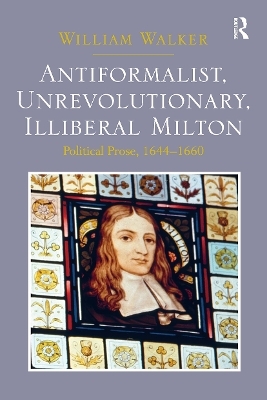
Antiformalist, Unrevolutionary, Illiberal Milton
Political Prose, 1644-1660
Seiten
2024
Routledge (Verlag)
978-1-032-92721-3 (ISBN)
Routledge (Verlag)
978-1-032-92721-3 (ISBN)
Citing Milton's major prose works from the civil war through to the Restoration, Walker reveals a Milton who is antiformalist in his constitutional thought, unrevolutionary in his general socio-political outlook, and markedly illiberal on a wide range of social, religious and political issues. Walker's book is thus a highly provocative challenge to
On the basis of a close reading of Milton's major published political prose works from 1644 through to the Restoration, William Walker presents the anti-formalist, unrevolutionary, illiberal Milton. Walker shows that Milton placed his faith not so much in particular forms of government as in statesmen he deemed to be virtuous. He reveals Milton's profound aversion to socio-political revolution and his deep commitments to what he took to be orthodox religion. He emphasises that Milton consistently presents himself as a champion not of heterodox religion, but of 'reformation'. He observes how Milton's belief that all men are not equal grounds his support for regimes that had little popular support and that did not provide the same civil liberties to all. And he observes how Milton's powerful commitment to a single religion explains his endorsement of various English regimes that persecuted on grounds of religion. This reading of Milton's political prose thus challenges the current consensus that Milton is an early modern exponent of republicanism, revolution, radicalism, and liberalism. It also provides a fresh account of how the great poet and prose polemicist is related to modern republics that think they have separated church and state.
On the basis of a close reading of Milton's major published political prose works from 1644 through to the Restoration, William Walker presents the anti-formalist, unrevolutionary, illiberal Milton. Walker shows that Milton placed his faith not so much in particular forms of government as in statesmen he deemed to be virtuous. He reveals Milton's profound aversion to socio-political revolution and his deep commitments to what he took to be orthodox religion. He emphasises that Milton consistently presents himself as a champion not of heterodox religion, but of 'reformation'. He observes how Milton's belief that all men are not equal grounds his support for regimes that had little popular support and that did not provide the same civil liberties to all. And he observes how Milton's powerful commitment to a single religion explains his endorsement of various English regimes that persecuted on grounds of religion. This reading of Milton's political prose thus challenges the current consensus that Milton is an early modern exponent of republicanism, revolution, radicalism, and liberalism. It also provides a fresh account of how the great poet and prose polemicist is related to modern republics that think they have separated church and state.
William Walker is Associate Professor in the School of the Arts and Media at the University of New South Wales, Australia.
Introduction; Chapter 1 Antiformalist Milton; Chapter 2 Unrevolutionary Milton; Chapter 3 Illiberal Milton; Chapter 101; Conclusion;
| Erscheinungsdatum | 16.10.2024 |
|---|---|
| Verlagsort | London |
| Sprache | englisch |
| Maße | 156 x 234 mm |
| Gewicht | 399 g |
| Themenwelt | Geisteswissenschaften ► Sprach- / Literaturwissenschaft ► Anglistik / Amerikanistik |
| Geisteswissenschaften ► Sprach- / Literaturwissenschaft ► Literaturwissenschaft | |
| ISBN-10 | 1-032-92721-6 / 1032927216 |
| ISBN-13 | 978-1-032-92721-3 / 9781032927213 |
| Zustand | Neuware |
| Haben Sie eine Frage zum Produkt? |
Mehr entdecken
aus dem Bereich
aus dem Bereich
Poetik eines sozialen Urteils
Buch | Hardcover (2023)
De Gruyter (Verlag)
CHF 83,90
Buch | Softcover (2024)
belleville (Verlag)
CHF 27,95


